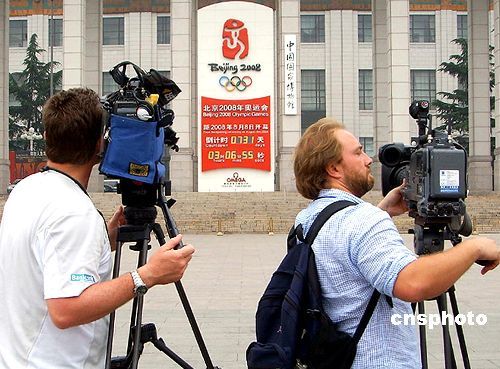 |
| Photo via Nick Trask |
LONDON is currently hosting the last Olympics of the
twentieth century as well as the first of the 21st. It is the last of the 20th
century because it is the last to be dominated by the century’s most
important technology: Television. London
is also the first 21st century Olympics as it is the first one where
the audience has talked back to the organisers and their broadcaster partner
proxies. Come Rio in 2016, the Olympics is likely be a very different spectator
sport thanks to social media, the power of the Internet and a global movement
for more audience power.
The professional Olympics are huge money and have become partly
slave to its sponsors who take ridiculous steps to ward off ambush marketing.
However in London as in previous Olympics, most of the shots are called by the television
companies who broadcast the games. They pay an extraordinary amount of money to the International Olympics Committee and local Olympic Committees for the rights. In America, the largest of the old-style TV hegemonies
NBC has had the rights to the summer and winter Olympics since 1988. Four years
ago they paid the AOC and IOC $2.2 billion for the Vancouver 2010 and London
2012. NBC made the London Games the most-watched Olympics ever by tape-delaying
marquee events to air in US prime time, maximising viewers and advertising
dollars.
Yet they are likely to lose money despite the large audience they have congregated for advertisers. NBC lost $223 million on Vancouver. It was on tape delay despite being in the same timezone as LA. This allowed NBC to maximise ads but it frustrated audiences who for the first time were seeing results in real time through the Internet and social media. For the TV companies who had the content but who could no longer control the message, these external forces had become,as Jeff Jarvis called them, a "gigantic spoiler machine".
But when it got to actual competition, the “award-winning
production team” stuffed up again. They advertised an interview with swimming
champion Missy Franklin before showing her gold medal-winning race. These abject failures and others led to Steven Marx creating the “nbcfail”
hashtag which went berserk.
But it was UK Independent LA-based journalist
Guy Adams who led the most high profile attack with a series of criticisms
online which eventually saw NBC call in favours at Twitter to suspend his account.
Adams had tweeted the email address of an NBC executive in charge of Olympics coverage, when he
was upset over the quality of that coverage, encouraging others upset to
contact the executive. “The man
responsible for NBC pretending the Olympics haven't started yet is Gary Zenkel.
Tell him what u think! Email: Gary.zenkel@nbcuni.com.
Twitter claimed this breached their guidelines as it contained
Zenkel’s email. Adams retorted Zenkel’s corporate email address was widely
available. The response to the ban was scathing. Novelist Irvine Welsh
said the ban illustrated three tendencies of hegemonic power “1) hates
criticism, 2) takes itself seriously 3) no sense of fun.”
NBC Sports Chairman Mark Lazarus claimed they understood the problem but his
words betrayed they hadn’t. “We listen. We read. We understand there are people
that don't like what we are doing, but we think that is a very loud minority
and the silent majority has been with us for the first six days," Lazarus
said. Well of course the “silent
majority” have been with NBC for a week because they have no choice if they
want to watch the Olympics. Silence is
not assent. Not everyone took to Twitter or Facebook to complain but as
they realise they can, more will.
As in drugs, the technology to beat the TV companies is
changing quickly. The BBC offers a comprehensive ad-free service of the Games
courtesy of British TV licence holders and the British taxpayer. On the Internet they use “geoblocking” based
on IP address to ensure only British audiences can view the content. But just as the Chinese get around
geo-blocking to access banned political sites, anyone across the world can view
the BBC content by masking their IP address using a virtual private
network. As Melbourne's Monash University copyright
law teacher Rebecca Giblin said broadcast television is a dying industry. As growing number of people are no longer
willing to watch TV on someone else's schedule," Giblin said. "They
want to watch it on their own terms when and where it's convenient for
them."
With the US delaying the opening ceremony, dodgy sites like
VIPBox.TV sprung up to fill the void. It
provides high quality live content at a price. As Mashable noted, VIPBox.TV wanted to install a proprietary MPlayer on your computer “which comes with a bunch of crapware that you will
want to decline, and it is one of those sites that can turn into a bit of a
pop-up monster.” VIPBox.TV are the bootleggers of the 21st century. They flourish only because of prohibition.
Author, editor and futurist Jeff Jarvis said NBCFail showed how the people formerly known as
the audience have found a voice to complain about the time-shifting “We in the
U.S. are being robbed of the opportunity to share a common experience with the
world in a way that was never before possible,” Jarvis said. He said the argument that the
time-shifting was done to make more money does not stand up. Instead it should have
super-served its audience by giving them what they want rather than what Mark Lazarus
and Gary Zenkel thought they wanted. “I ask you to imagine what Olympics
coverage would look like if Google had acquired the rights,” Jarvis said “It
would give us what we want and make billions, I’ll bet."












